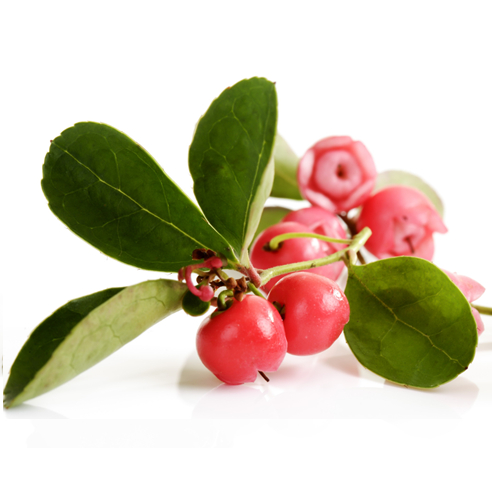
Wintergreen
Scientific names: Gaultheria procumbens
Family: Ericaceae
Alternate names: American Wintergreen, Boxberry, Canada Tea, Checkerberry, Deerberry, Eastern Teaberry, Essence de Gaulthérie, Gaulteria, Gaultheria Oil, Gaulthérie Couchée, Ground Berry, Hilberry, Huile de Thé des Bois, Mountain Tea, Oil of Wintergreen, Partridge Berry, Petit Thé, Petit Thé des Bois, Spiceberry, Teaberry, Thé de Montagne, Thé de Terre-Neuve, Thé des Bois, Thé du Canada, Thé Rouge, Wax Cluster
Background
Wintergreen (Gaultheria procumbens) is an evergreen shrub native to the US and Canada. Its leaves and oil have been traditionally used for pain.
Wintergreen leaf contains an aspirin-like chemical called methyl salicylate. It has effects that might reduce pain, swelling, and fever.
People use wintergreen for back pain, joint pain, muscle soreness, and many other conditions, but there is no good scientific evidence to support these uses.
Don't confuse wintergreen with periwinkle or pipsissewa, which are sometimes called wintergreen. These are not the same.
Wintergreen leaf contains an aspirin-like chemical called methyl salicylate. It has effects that might reduce pain, swelling, and fever.
People use wintergreen for back pain, joint pain, muscle soreness, and many other conditions, but there is no good scientific evidence to support these uses.
Don't confuse wintergreen with periwinkle or pipsissewa, which are sometimes called wintergreen. These are not the same.
Safety Safety definitions
When taken by mouth: Wintergreen is commonly consumed in very small amounts in foods. Wintergreen leaf is possibly safe when used as medicine. It seems to be well-tolerated. But wintergreen oil is possibly unsafe. It contains methyl salicylate, which is toxic. Consuming as little as 6 mL (a little over a teaspoon) of the oil can be fatal.
When applied to the skin: Wintergreen oil is possibly safe. It seems to be well-tolerated, but some people might experience skin irritation.
Breast-feeding: Wintergreen is likely unsafe when taken by mouth or used on the skin as a medicine while breast-feeding. It may be toxic to nursing infants.
Children: Wintergreen leaf and oil are likely unsafe when taken by mouth in children. Taking as little as 4 mL (less than a teaspoon) of wintergreen oil by mouth can be fatal. Wintergreen oil is likely unsafe when applied to the skin of children less than 2 years-old.
Stomach and intestinal inflammation: Taking wintergreen by mouth might make these conditions worse.
Salicylate or aspirin allergy, asthma, or nasal polyps: Wintergreen might cause an allergic reaction in people who are allergic to aspirin or other salicylate compounds, or who have asthma or nasal polyps.
When applied to the skin: Wintergreen oil is possibly safe. It seems to be well-tolerated, but some people might experience skin irritation.
Special Precautions & Warnings:
Pregnancy: There isn't enough reliable information to know if wintergreen is safe to use in larger amounts as medicine while pregnant. Stay on the safe side and stick to very small food amounts.Breast-feeding: Wintergreen is likely unsafe when taken by mouth or used on the skin as a medicine while breast-feeding. It may be toxic to nursing infants.
Children: Wintergreen leaf and oil are likely unsafe when taken by mouth in children. Taking as little as 4 mL (less than a teaspoon) of wintergreen oil by mouth can be fatal. Wintergreen oil is likely unsafe when applied to the skin of children less than 2 years-old.
Stomach and intestinal inflammation: Taking wintergreen by mouth might make these conditions worse.
Salicylate or aspirin allergy, asthma, or nasal polyps: Wintergreen might cause an allergic reaction in people who are allergic to aspirin or other salicylate compounds, or who have asthma or nasal polyps.
Effectiveness
Effective Effectiveness definitions
There is interest in using wintergreen for a number of purposes, but there isn't enough reliable information to say whether it might be helpful.
Dosing & administration
Traditionally, wintergreen leaf has been prepared as a tea. It has also been used in topical gels, lotions, and ointments. But as medicine, there isn't enough reliable information to know what an appropriate dose of wintergreen might be. Keep in mind that natural products are not always necessarily safe and dosages can be important. Be sure to follow relevant directions on product labels and consult a healthcare professional before using.
Interactions with pharmaceuticals
Aspirin
Interaction Rating=Moderate Be cautious with this combination.
Wintergreen oil contains a chemical similar to aspirin. Using large amounts of wintergreen oil on your skin and taking aspirin at the same time might increase the risk of side effects.
Warfarin (Coumadin)
Interaction Rating=Major Do not take this combination.
Warfarin is used to slow blood clotting. Wintergreen oil can also slow blood clotting. Taking wintergreen oil along with warfarin can increase the chances of bruising and bleeding. Be sure to have your blood checked regularly. The dose of your warfarin might need to be changed.
Interactions with herbs & supplements
There are no known interactions with herbs and supplements.
Interactions with foods
There are no known interactions with foods.
vital.ly has licensed monographs from TRC Healthcare.
This monograph was last reviewed on 31/07/2023 10:00:00 and last updated on 24/12/2012 22:34:35. Monographs are reviewed and/or updated multiple times per month and at least once per year.
Natural Medicines disclaims any responsibility related to medical consequences of using any medical product. Effort is made to ensure that the information contained in this monograph is accurate at the time it was published. Consumers and medical professionals who consult this monograph are cautioned that any medical or product related decision is the sole responsibility of the consumer and/or the health care professional. A legal License Agreement sets limitations on downloading, storing, or printing content from this Database. No reproduction of this monograph or any content from this Database is permitted without written permission from the publisher. It is unlawful to download, store, or distribute content from this site.




